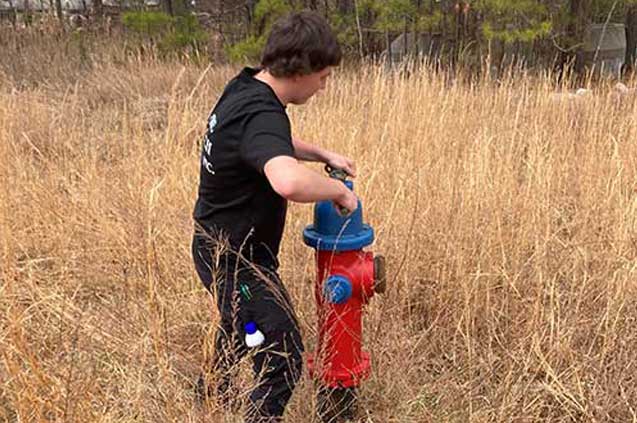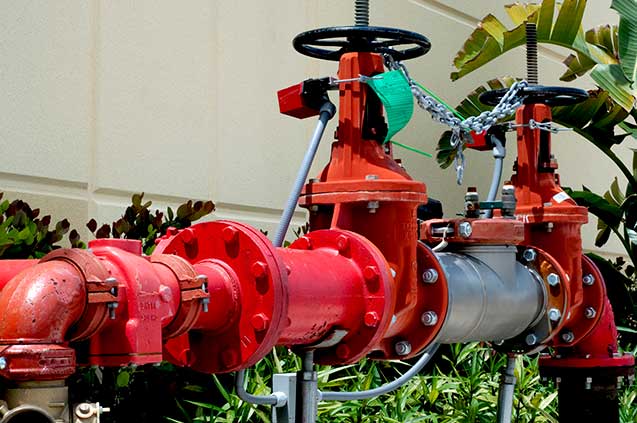Hydrants

Fire Tech Services offers professional fire hydrant flow testing services to ensure the reliability and effectiveness of fire protection systems. Our services adhere to NFPA 291 standards, providing accurate and comprehensive flow testing data essential for maintaining fire hydrant performance.
Preparation and Setup
Prior to conducting flow testing, our certified technicians carefully assess the site and hydrant locations to ensure safe and efficient testing procedures. We coordinate with property owners, municipalities, and relevant authorities to obtain necessary permits and permissions for testing. Our team ensures that all equipment and tools are in optimal condition for accurate testing.
Flow Testing
Fire Tech Services conducts flow testing according to NFPA 291 guidelines, which outline procedures for both static and residual flow testing. Static flow tests measure the flow rate of water from hydrants under no-pressure conditions, while residual flow tests measure flow rates under simulated firefighting conditions. Our technicians use calibrated equipment to accurately measure flow rates and record data for analysis.
Data Analysis & Reporting
After completing flow testing, Fire Tech Services analyzes the collected data to assess the performance of fire hydrants. We compare flow rates against NFPA 291 requirements to determine compliance and identify any deficiencies that may affect fire protection capabilities. Our comprehensive reports include detailed findings, recommendations for corrective actions, and documentation of test results for regulatory compliance. Reports can be viewed from your account in the Customer Portal portal.
Prompt Submission of Reports
Fire Tech Services prioritizes timely submission of reports to local authorities and municipalities. We understand the importance of providing accurate and up-to-date information to support regulatory compliance and emergency planning efforts.
Maintenance and Repairs
If flow testing reveals any issues or deficiencies with fire hydrants, Fire Tech Services provides recommendations for maintenance or repairs to ensure optimal performance. Our team can provide necessary maintenance tasks such as flushing, lubricating, or replacing components to address identified issues and restore hydrant functionality. We adhere to NFPA 291 guidelines for hydrant maintenance practices to maintain compliance and reliability.
Backflow Devices

Fire Tech Services provides professional backflow testing services in accordance with NFPA 25 standards, ensuring the integrity and compliance of backflow prevention devices. Our comprehensive services encompass testing and maintenance to safeguard potable water supplies from contamination risks.
Preparation and Inspection
Our certified technicians begin by conducting a thorough inspection of backflow prevention devices to assess their condition and identify any potential issues. We carefully examine valves, seals, fittings, and other components to ensure they are functioning properly and in compliance.
Testing Procedures
Fire Tech Services performs backflow testing procedures, which outline specific testing methods and frequencies. We conduct both initial and periodic tests to verify the effectiveness of backflow prevention devices in preventing the reverse flow of contaminants into the potable water supply. Our technicians utilize calibrated equipment and industry-standard testing protocols to accurately measure pressure differentials and evaluate device performance.
Documentation & Reporting
Upon completion of backflow testing, Fire Tech Services provides detailed documentation and reports to clients, as well as regulatory authorities as required. Our comprehensive reports include test results, observations, recommendations for any necessary repairs or maintenance, and certification of compliance. We prioritize accurate and thorough documentation to support regulatory compliance and facilitate record-keeping for ongoing maintenance and testing requirements. Reports can be viewed from your account in the Customer Portal portal.
Maintenance and Repairs
If backflow testing reveals any deficiencies or issues with backflow prevention devices, Fire Tech Services offers prompt and professional maintenance and repair services. Our technicians are trained to identify and address common issues such as leaks, valve malfunctions, or improper installations.
By delivering comprehensive backflow testing services in alignment with NFPA 25 standards, Fire Tech Services helps safeguard potable water supplies and mitigate the risk of contamination. We prioritize accuracy, professionalism, and regulatory compliance to provide clients with peace of mind and confidence in the integrity of their backflow prevention systems.